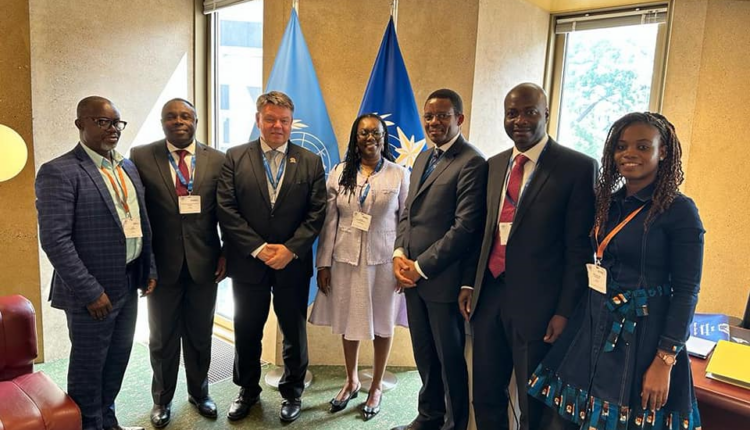Ghana’s Minister for Communications and Digitalization, Mrs. Ursula Owusu-Ekuful has expressed grave concerns over lack of effectiveness in implementing measures for early warning and disaster risk reduction on the continent.
Speaking at the 19th Session of the World Meteorological Organization Congress in Geneva, Mrs. Owusu-Ekuful said the rate of Early Warning implementation is much lower in Africa than any other Region; with approximately 60% of people in Africa not having access to Early Warning System to cope with extreme weather and climate change, as per the WMO’s 2021 State of the Climate Report for Africa.
“This exacerbates the risk for African people, and this situation should not be allowed to persist,” she stated.
She added, “In addition to lives and property lost to floods, climate impact on agriculture, food security, health, and energy affects economies especially our fragile ones. In Ghana agriculture contributes up to 54% of our GDP and employs an estimated 44.7% of the country’s workforce. Therefore, anything that threatens agriculture, such as extreme weather events and climate variability, threatens the very core and fibre of our economies.
“We are concerned that the rate of Early Warning implementation is much lower in Africa than any other Region; with approximately 60% of people in Africa not having access to Early Warning System to cope with extreme weather and climate change (According to the WMO’s 2021 State of the Climate Report for Africa). This exacerbates the risk for African people and this situation should not be allowed to persist. We have to be proactive and to protect its people through Early Warning system using modern digital technology.”
The Ghanaian minister, therefore, called proactive measures by the leaders on the continent to protect their people through the Early Warning system using modern digital technology. She said advancements in technology, like satellite monitoring, have enabled NMHSs to predict weather conditions with increased accuracy, enabling authorities to provide more specific, localized warnings to people in affected areas.
She further noted that the integration of technologies, social media, apps, text messages, and push notifications make it easier for authorities to reach out to individuals in a more targeted and timely manner in emergency situations.
“Leveraging these technologies are part of our strategy to mitigate the gaps in access to early warning to provide timely weather services. The Ghana Meteorological Agency’s “My Flood Risk Accra App” which provides real-time flood and weather alerts for our capital city, was launched in August 2021. The app informs citizens about their exposure to flood risks for early preparedness and early action,” she stated.
GMet Weather Observation System
The lawmaker further said plans are underway for effective digitalization aspect of the Ghana Meteorological Agency (GMet) weather monitoring systems by the Akufo-Addo administration.
She indicated that, this when accomplished will provide an improved interface for analysis, and permanently overcome the Agency’s distribution weather challenges.
“Ghana is also using Impact-based Forecast (IBF) now, providing updates on the likelihood and impact of extreme weather expected over specific areas to inform planning and support decision-making especially for vulnerable communities.
“The Government of Ghana is determined to fully digitalize GMet weather observation systems and provide enhanced interface for analysis and permanently resolve the dissemination challenges of the Agency. In line with the multi-sectoral engagement to develop and enhance Early Warning delivery, GMet, HYDRO and WRC are collaborating with UKCEH and WMO to provide sub-seasonal to seasonal hydrological conditions in the Ghana towards water sustainability and I look forward to its successful implementation”.
Special Thanks
Hon. Ursula in addition expressed excitement over the work done by the World Meteorological Organization (WMO) and other partners for the establishment of the Ghana National Framework for Climate Services.
“I must thank the WMO and other partners for the establishment of the Ghana National Framework for Climate Services to meet the practical needs of users of all sectors which was launched on World Meteorological Day, 2023.
“Ghana and many Africa countries are working hard to provide efficient Early Warning Systems despite the challenges they face. While acknowledging the efforts made towards forging collaboration among your member states, they are still inadequate. I hereby reiterate my appeal to the session to encourage even greater partnerships and collaboration between developed and developing NMHSs to share knowledge, experiences and resources to improve climate service delivery globally. We can’t afford to leave any one, any region behind and any life lost due to lack of adequate warning and preparedness is one life too many.”
Ghana and other African countries continue to have challenges with the Early Warning system as extreme weather conditions escalate globally.
An estimated 3.6 billion people live in conditions that make them highly vulnerable to climate variability and change, and Africa is the second hardest hit by floods and hydrometeorological phenomenon.


Comments are closed.